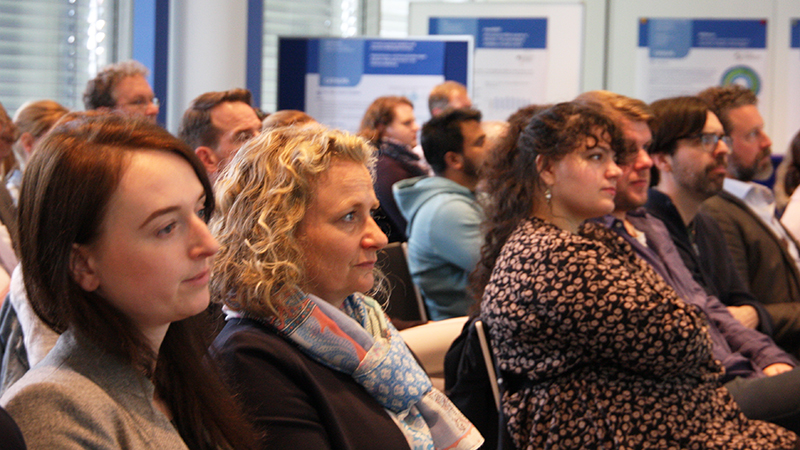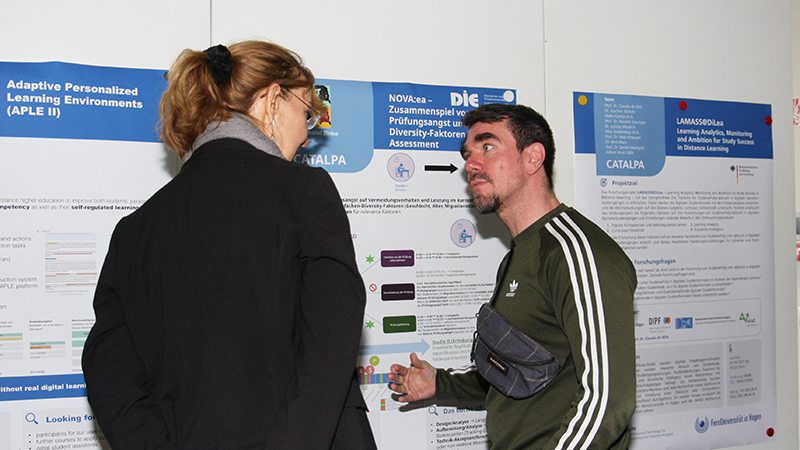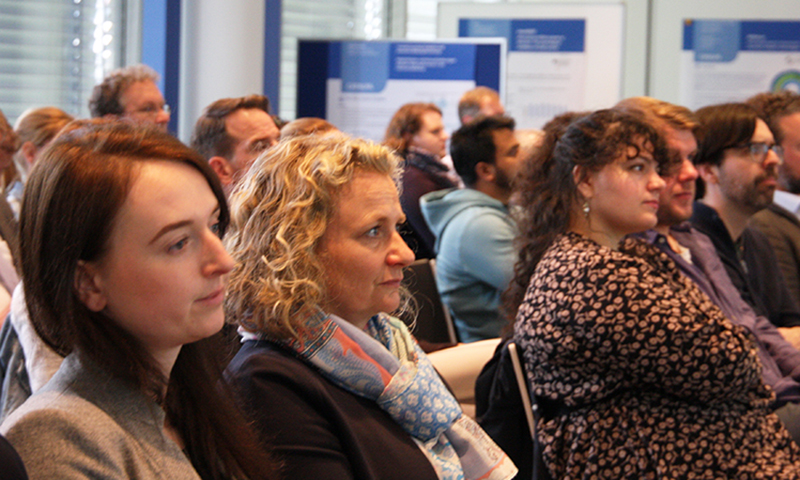News
CATALPA Day: Insight into the scientific "engine room"
[07.07.2023]"What do they actually do at CATALPA?" - This question was answered by the research center at its CATALPA Day with a mix of overview and illustrative examples. The Scientific Director Prof. Dr. Dr. Friedrich W. Hesse as well as Prof. Dr. Claudia de Witt, Prof. Dr. Torsten Zesch and Dr. Niels Seidel offered an insight into the "engine room" of their research.
 Photo gallery
Photo gallery
Dr. Niels Seidel introduced the fictitious student Alice. With the help of learning analytics - a central research method at CATALPA - it can be shown that Alice, in contrast to her fellow student Bob, spends a lot of time on her study content but has not yet completed a single assessment. Alice receives an appropriate prompt from a digital assistant, a friendly little robo-figure. As a result, she may be more confident about attempting the tasks.
As with Alice's example, CATALPA always aims to first better understanding learning processes in digital settings, in order to then increase educational success and ultimately educational equity with tailored support. To this end, around 60 researchers from the fields of computer science, learning analytics, computational linguistics, psychology, educational science and organizational sociology are working together on an interdisciplinary basis.
Personalized feedback generated by AI - this is a core topic that crops up in many of the research projects. At FernUni in particular, with over 70,000 students, it is not possible for lecturers to provide individual feedback for everyone. AI could help remedy this situation in the future. As Prof. Dr. Claudia de Witt emphasized, it is important that AI-generated feedback is not only technically correct, but also didactically meaningful.
The appropriate feedback for free-text tasks is particularly challenging, as Prof. Dr. Torsten Zesch made clear with an example from computational linguistics: To the simple question "What do pandas eat?" there are numerous other correct answers besides "Pandas eat bamboo" that must be recognized by an AI, such as "Pandas feed on bamboo," "They eat bamboo," or "Bamboo is eaten by pandas."
Cooperation and networking with other institutions
 Photo gallery
Photo gallery
Another central research topic is the action or interaction of students in virtual learning groups. Here are those who regularly interact with others. Others merely pick up tips but do not give any input of their own - and still others stand completely on the sidelines and are not integrated into the interaction of the group at all. The researchers are now looking for the causes of this behavior on the one hand, and on the other hand for individually appropriate methods of intervention that fit for a very heterogeneous student community.
For its research projects, CATALPA cooperates in part with other institutions, such as the German Institute for Adult Education (DIE) or the Alexander von Humboldt Institute for Internet and Society (HIIG). The research center is well networked with others. Thus, there was a fitting guest lecture at the CATALPA day by Prof. Dr. Nikol Rummel from the Center for Advanced Internet Studies (CAIS). Under the title "Cooperative Learning in Computer Supported Learning Settings: Support for Learners and Teachers" she gave a brief overview of her research activities.
Criteria of Leibniz Association
Networking with other research institutions such as CAIS is essential for CATALPA, says Prof. Dr. Dr. Friedrich Hesse. This is because the research center's declared goal is to meet the criteria of the Leibniz Association, both with the level of its publications and at other levels. An intensive scientific discourse, for example with the international scientific advisory board of CATALPA, is indispensable for this. Just recently, the advisory board and the CATALPA management team exchanged views on the objectives and future structure of the research center.
A total of three research professorships are planned at CATALPA. With Torsten Zesch, the Professorship of Computational Linguistics has already been filled. The professorship in Learning Analytics is currently in the appointment process, and the third in Learning Sciences in Higher Education is to be advertised soon. In addition, there are three Junior Research Groups with different thematic focuses, and nine FernUni professors and postdocs are currently working on CATALPA projects. The research center is currently financed by the state of North Rhine-Westphalia with 2.7 million euros per year, in addition to third-party projects such as those funded by the German Research Foundation (DFG) and the German Federal Ministry of Education and Research (BMBF).


